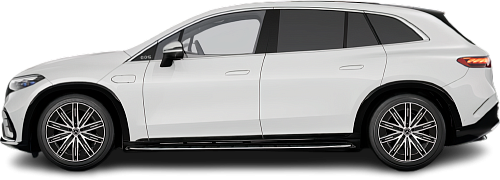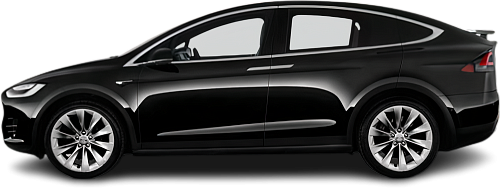Global EV Comparison: Mercedes EQS SUV 450 4MATIC vs Tesla Model X Standard Range
Struggling to Decide? Let AI Help!
Your AI Summary Is Ready!
General Info
Since both vehicles have been discontinued, they are now only available on the used car market. You can get the Tesla Model X Standard Range (2019-2020) for as low as €35950, while the Mercedes EQS SUV 450 4MATIC (2022-2023) was never offered for sale in Europe.
The two vehicles share the same body style: SUV.
| Property | Mercedes EQS SUV 450 4MATIC | Tesla Model X Standard Range |
|---|---|---|
| Years of Production | 2022-2023 | 2019-2020 |
| Current Status | Discontinued | Discontinued |
| Country of Manufacture | USA | Netherlands, USA |
| Body Style | SUV | SUV |
| Market Availability | USA | EU, USA |
| Price Europe (Used) | - Price Europe (Used) | €35950 |
| GCC Score | 7 | 6.9 |
Range and Efficiency
While the Mercedes EQS SUV 450 4MATIC (2022-2023) offers a longer real-world range and a bigger battery, it is less energy-efficient than the Tesla Model X Standard Range (2019-2020).
| Property | Mercedes EQS SUV 450 4MATIC | Tesla Model X Standard Range |
|---|---|---|
| Range (EPA) | 459 km | 415 km |
| Range (WLTP) | 616 km | 375 km |
| Range (GCC) | 473 km | 344 km |
| Battery Capacity (Nominal) | 120 kWh | 75 kWh |
| Battery Capacity (Usable) | 108.4 kWh | 72.5 kWh |
| Efficiency per 100 km | 22.9 kWh/100 km | 21.1 kWh/100 km |
| Efficiency per kWh | 4.36 km/kWh | 4.74 km/kWh |
| Range and Efficiency Score | 6.2 | 5.1 |
Charging
Both vehicles utilize a standard 400-volt architecture.
The Mercedes EQS SUV 450 4MATIC (2022-2023) offers faster charging speeds at DC stations, reaching up to 207 kW, while the Tesla Model X Standard Range (2019-2020) maxes out at 100 kW.
The Tesla Model X Standard Range (2019-2020) features a more powerful on-board charger, supporting a maximum AC charging power of 16.5 kW, whereas the Mercedes EQS SUV 450 4MATIC (2022-2023) is limited to 11 kW.
| Property | Mercedes EQS SUV 450 4MATIC | Tesla Model X Standard Range |
|---|---|---|
| Max Charging Power (AC) | 11 kW | 16.5 kW |
| Max Charging Power (DC) | 207 kW | 100 kW |
| Architecture | 400 V | 400 V |
| Charge Port | CCS Type 2 | Tesla Type 2 (Mennekes) |
| Charging Score | 7.1 | 6.5 |
Performance
Both vehicles are all-wheel drive.
Although the Mercedes EQS SUV 450 4MATIC (2022-2023) has more power, the Tesla Model X Standard Range (2019-2020) achieves a faster 0-100 km/h time.
| Property | Mercedes EQS SUV 450 4MATIC | Tesla Model X Standard Range |
|---|---|---|
| Drive Type | AWD | AWD |
| Motor Type | PMSM (front), PMSM (rear) | PMSM (front), IM (rear) |
| Motor Power (kW) | 265 kW | 250 kW |
| Motor Power (hp) | 355 hp | 335 hp |
| Motor Torque | 800 Nm | 550 Nm |
| 0-100 km/h | 6 s | 4.8 s |
| Top Speed | 210 km/h | 250 km/h |
| Performance Score | 5.8 | 5.8 |
Dimensions
The Tesla Model X Standard Range (2019-2020) has a wider body, offering a more shoulder room, while the Mercedes EQS SUV 450 4MATIC (2022-2023) stands taller for a more elevated driving position. Despite these differences, their lengths are nearly identical.
The Mercedes EQS SUV 450 4MATIC (2022-2023) boasts a more extended wheelbase.
| Property | Mercedes EQS SUV 450 4MATIC | Tesla Model X Standard Range |
|---|---|---|
| Length | 5125 mm | 5052 mm |
| Width (with Mirrors) | 2157 mm | 2271 mm |
| Width (w/o Mirrors) | 1959 mm | 1999 mm |
| Height | 1718 mm | 1684 mm |
| Wheelbase | 3210 mm | 2965 mm |
Cargo and Towing
The Mercedes EQS SUV 450 4MATIC (2022-2023) features a larger trunk, but the Tesla Model X Standard Range (2019-2020) offers greater maximum cargo capacity when the rear seats are folded.
A frunk (front trunk) is available in the Tesla Model X Standard Range (2019-2020), but the Mercedes EQS SUV 450 4MATIC (2022-2023) doesn’t have one.
The Tesla Model X Standard Range (2019-2020) is better suited for heavy loads, offering a greater towing capacity than the Mercedes EQS SUV 450 4MATIC (2022-2023).
| Property | Mercedes EQS SUV 450 4MATIC | Tesla Model X Standard Range |
|---|---|---|
| Number of Seats | 5, 7 | 5, 6, 7 |
| Curb Weight | 2805 kg | 2427 kg |
| Cargo Volume (Trunk) | 645 l | 357 l |
| Cargo Volume (Max) | 2100 l | 2431 l |
| Cargo Volume (Frunk) | - Cargo Volume (Frunk) | 187 l |
| Towing Capacity | 1800 kg | 2250 kg |
| Cargo and Towing Score | 8.4 | 8.9 |




